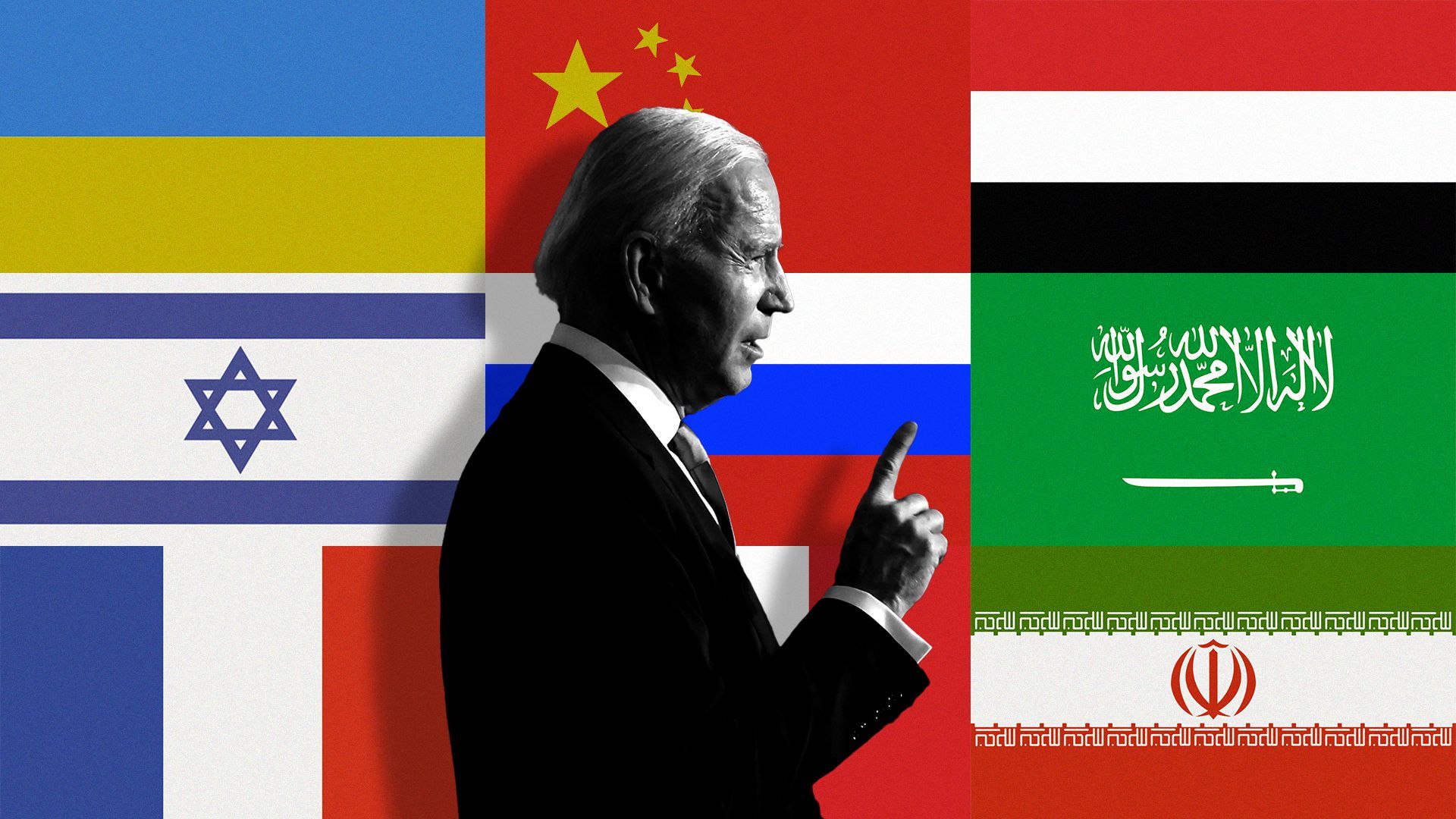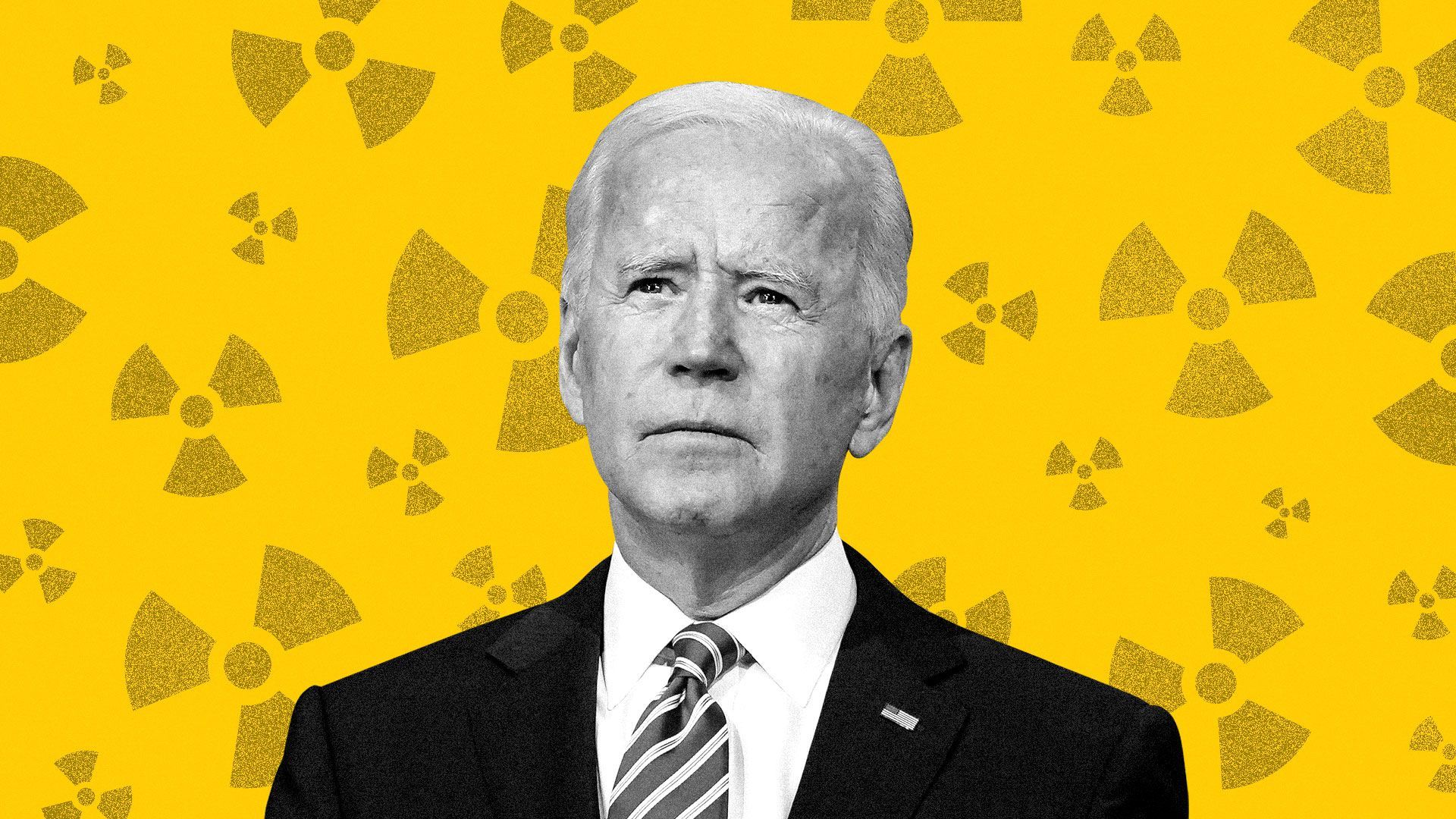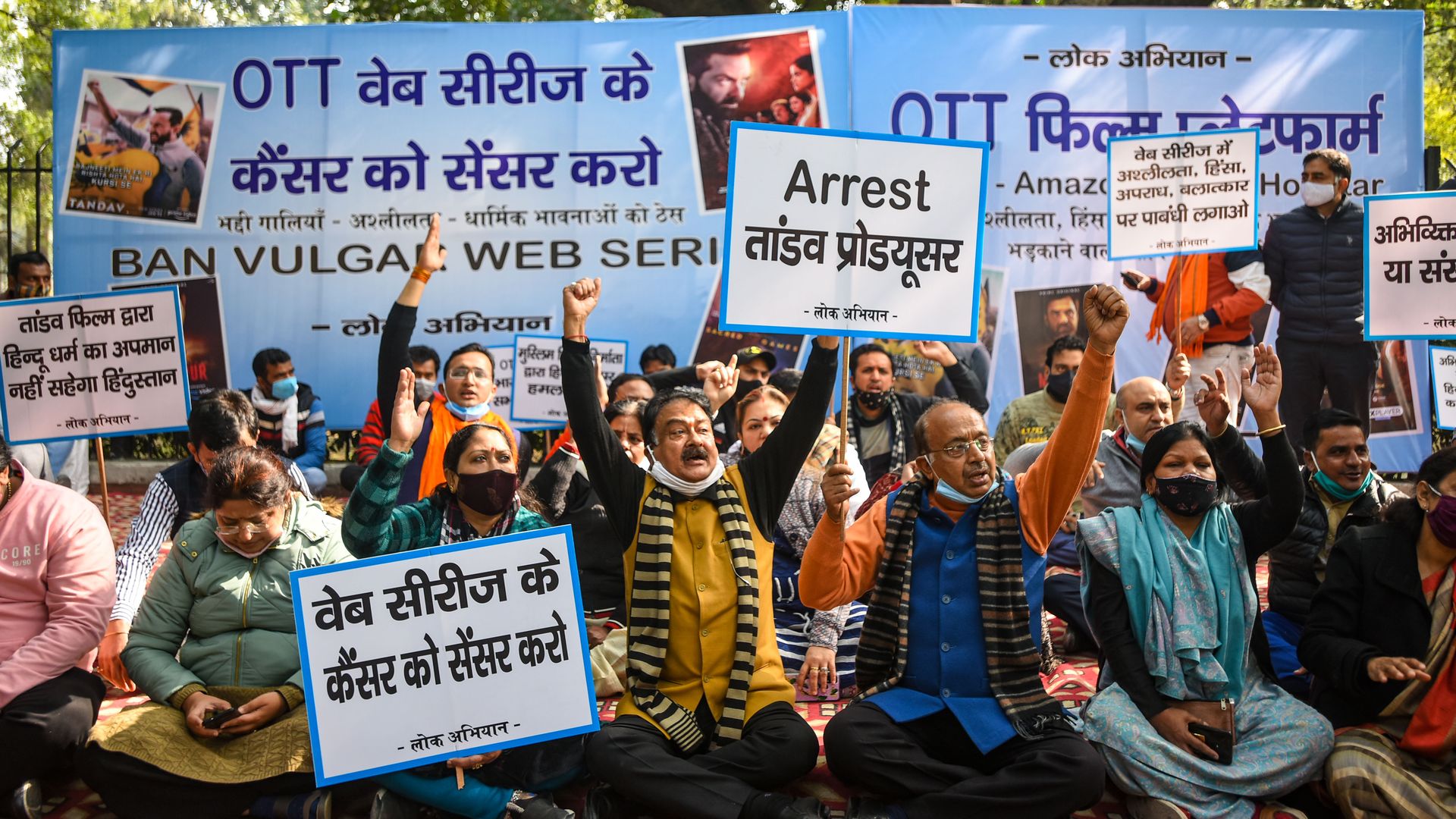| | | | | | | Presented By Babbel | | | | Axios World | | By Dave Lawler ·Jan 21, 2021 | | Welcome back to Axios World. - We've got a new president here in Washington, so I'm starting tonight with what he has and hasn't changed so far in U.S. foreign policy (1,662 words, 6 minutes)
- Thanks as always for reading — tell a friend to sign up!
Situational awareness: Lloyd Austin received a congressional waiver this evening, which will allow the retired general to serve as defense secretary despite having only left the military in 2016. He's expected to be confirmed on Friday (WSJ). | | | | | | 1 big thing: What has changed, and what hasn't |  | | | Photo Illustration: Brendan Lynch/Axios. Photo: Chip Somodevilla/Getty Images | | | | President Biden swiftly recommitted the U.S. to the Paris climate accord and the World Health Organization, but America's broader foreign policy is in a state of flux between the Trump and Biden eras. Driving the news: One of the most striking moves from the Biden administration thus far was a show of continuity — concurring with the Trump administration's last-minute determination that China had committed "genocide" against Uyghur Muslims. - Secretary of State-designate Tony Blinken also said the U.S. would continue to recognize Jerusalem as the capital of Israel, consider Juan Guaidó the legitimate interim president of Venezuela, provide lethal defensive weaponry to Ukraine, and oppose the Nord Stream 2 gas pipeline between Russia and Germany.
- President Trump's trade war tariffs will remain in place for now, pending a review, as will his plan to extricate the U.S. from Afghanistan.
- Biden's nominees spent significant chunks of their confirmation hearings promising not to make sudden changes to Trump's policies. That's perhaps to be expected, as they have no incentive to make waves before facing a Senate vote.
Still, Biden has made some immediate changes on substance, in addition to style. What they're saying: Blinken said unequivocally that the U.S. would end its support for the Saudi-led bombing campaign in Yemen. - He also vowed to swiftly review Trump's controversial decision to label the Houthi rebels a terror group.
- Meanwhile Avril Haines, the newly confirmed director of national intelligence, said she'd declassify an intelligence report on the murder of Jamal Khashoggi by Saudi agents. It reportedly assigns culpability to Crown Prince Mohammed bin Salman.
On Iran, both Blinken and Haines reiterated Biden's plan to rejoin the 2015 nuclear deal if Iran returns to compliance. - Yes, but: Both cautioned that was "a long way off," that allies like Israel would be consulted, and that Biden's true objective was a broader deal that also covers Iran's missile program and regional behavior.
- Worth noting: Blinken said he doesn't believe Biden has legal authorization to strike Iran without consulting Congress.
The state of play: Biden has taken early opportunities to signal that the U.S. will recommit to multilateralism, including over the pandemic. - Blinken announced that the U.S. would join the COVAX initiative — the global effort from the World Health Organization and other groups to ensure that every country has access to COVID-19 vaccines.
- Virtually the entire world had already signed onto COVAX, apart from the U.S. and Russia.
- Biden's nominees didn't signal any immediate policy changes on China, though Blinken did emphasize the importance of working with allies to confront Beijing.
Biden also ended the travel ban targeting a dozen mostly majority-Muslim countries. - He promised during the campaign to raise America's annual refugee admissions cap to 125,000 from the historic low of 15,000 under Trump.
The bottom line: Biden's team has a radically different perspective than Trump's on how to confront the greatest challenges facing the U.S. — or even what those challenges are. But it will take time to truly chart a new course. |     | | | | | | 2. New life for New START |  | | | Photo illustration: Eniola Odetunde/Axios. Photo: Drew Angerer/Getty Images | | | | President Biden will seek a five-year extension of the New START nuclear arms control pact with Russia before it expires on Feb. 5, Press Secretary Jen Psaki confirmed this evening. Why it matters: The 2010 treaty is the last remaining constraint on the arsenals of the world's two nuclear superpowers, limiting the number of deployed nuclear warheads and the bombers, missiles and submarines that can deliver them. - Russia has already expressed support for a five-year extension — a simple process that only requires an exchange of diplomatic notes.
The other side: The Trump administration was skeptical of New START, arguing that it had allowed Russia to build up advanced nuclear systems that aren't constrained by the treaty. - Trump's arms control envoy, Marshall Billingslea, had also insisted that China be brought into the arms control process.
- Billingslea attempted to negotiate a shorter-term extension of New START, paired with a freeze on all nuclear warheads and a commitment to broaden future talks to include other nuclear powers. That deal never came together.
The big picture: The Biden administration argues that the U.S. is better off pursuing discussions on the future of arms control — and confrontation with Russia on other issues — with the New START guardrails in place. - Officials told the Washington Post that Biden is ruling out another "reset" with Russia in light of the Kremlin's "reckless and aggressive actions" in recent years.
|     | | | | | | 3. Data du jour: Europe has high hopes for Biden |  Data: Pew Research Center; Chart: Andrew Witherspoon/Axios Europeans expect brighter days ahead under Biden, according to three new polls — but his election has not fully assuaged doubts about U.S. democracy and global leadership. By the numbers: The Pew Research Center finds that 79% of Germans have confidence in Biden to do the right thing regarding world affairs vs. just 10% for Trump. The percentage jumps in France (11% to 72%) and the U.K. (19% to 65%) were nearly as sharp. - Flashback: The spike in confidence from one president to the next mirrors the transition from George W. Bush to Barack Obama in 2009.
Meanwhile, a poll of four countries shared with Axios by strategic consulting firm Kekst CNC finds that Europeans are most optimistic about what Biden's election will mean for efforts to tackle climate change, as well as for global stability and security. - Views of Biden were largely positive across the political spectrum in France, Germany, Sweden and the U.K. (supporters of Germany's far-right AfD were the lone exception) — but lower-income respondents in those countries were less optimistic about Biden's arrival than wealthier ones.
But a third poll of 11 European countries, published Tuesday by the European Council on Foreign Relations, finds that while Europeans generally view Biden positively, many think he'll be unable to reverse America's trajectory. - 61% of all respondents — including 81% of Brits and 71% of Germans — believe the U.S. political system is "completely" or "somewhat" broken.
- And while 49% believe the U.S. will be able to overcome its internal divisions and help solve global problems, 59% believe China will become the world's leading superpower within the next decade.
The state of play: America's global favorability ratings hit new lows following the Capitol insurrection on Jan. 6, per a Morning Consult tracker. |     | | | | | | A message from Babbel | | Start speaking a new language in three weeks | | |  | | | | In 2021, let language take you places with Babbel. The background: This language learning app gives you bite-sized, manageable lessons in a variety of languages. It'll have you speaking the basics in three weeks. Sign up today and get 60% off. | | | | | | 4. Europe: Filling Merkel's shoes |  | | | Armin Laschet. Photo: Christian Marquar/Pool/Getty | | | | The race to lead Germany's Christian Democratic Union (CDU) came down to a conservative, a modernizer and a continuity candidate. What happened: The party of Chancellor Angela Merkel opted for continuity on Sunday, picking North Rhine-Westphalia Governor Armin Laschet, a centrist Merkel ally. With Merkel set to step down later this year after 16 years in power, Laschet is now the front-runner to lead the German center-right into September's elections. Like Merkel, Laschet is seen as a champion of German industry who backs close economic ties with China and Russia, but "the tide is turning" on those issues, says Sudha David-Wilp of the German Marshall Fund. - Laschet has come under scrutiny for his positions on allowing Huawei into Germany's 5G networks and maintaining good relations with Vladimir Putin.
- "We have to look at what he said in the past as a reflection of his role as the governor of a state with lots of business interests with China and Russia, but now he's in a new role," David-Wilp says.
- "He'll still have to support German business, but voters in Germany are starting to see Russia and China in a new light."
The state of play: The CDU and its Bavarian sister party, the CSU, will pick a joint chancellor candidate this spring. - As CDU leader, Laschet would be the traditional pick, but there could still be a twist if he's seen as "a drag on the party" in upcoming regional elections, David-Wilp says.
- "The CDU is very pragmatic and shrewd, and they're going to go with a winner."
- Laschet would bring a stylistic change from Merkel, David-Wilp says, in that he's a "real retail politician" — something no one would accuse Merkel of being.
What to watch: David-Wilp says Germans aren't fully prepared for the "political earthquake" coming later this year. - "There's a Generation Merkel here in Germany, and I think it will be difficult once she exits the stage."
|     | | | | | | 5. Opposition leader update |  | | | Navalny is escorted to prison by police. Photo: Alexander Nemenov/AFP via Getty | | | | Russian opposition leader Alexey Navalny remains in jail after being stopped at passport control upon his return to Moscow on Sunday and swiftly sentenced to 30 days of pre-trial detention. - But he still managed to make global headlines when his anti-corruption group released a YouTube video exposing a "billion-dollar palace" that it claimed was built for Vladimir Putin. The video now has 50 million views.
- Putin's spokesman denied that the palace belonged to him, but offered no alternative explanation.
- Michael McFaul, the former ambassador to Russia (2012-2014), tells me Navalny's detention could become Biden's first foreign policy crisis: "Whatever else was in their transition documents, this is now front and center for them."
Ugandan opposition leader Bobi Wine remains under house arrest a week after he refused to accept official election results that gave a clear win to longtime President Yoweri Museveni. - The U.S. ambassador was barred from visiting Wine, who says he has now run out of food and is unable to leave home.
- National Security Adviser Jake Sullivan has spoken out on Wine's case, as well as Navalny's.
|     | | | | | | 6. India: Streaming and censoring |  | | | Protesters call for Tandav to be banned. Photo: Amal KS/Hindustan Times via Getty | | | | The creators of the Amazon Prime mini-series Tandav have apologized and promised to re-edit several scenes after coming under pressure from members of India's Hindu Nationalist ruling party. - In the show, Bollywood star Saif Ali Khan plays the scheming son of India's prime minister.
- Several members of the ruling BJP have called the show offensive to Hinduism. The deputy chief minister of Uttar Pradesh, India's largest state, promised "strict legal action" against its creators, who swiftly promised to update the show.
Zoom out: This is part of a pattern, the FT points out: - "Police in the state of Madhya Pradesh filed a criminal complaint in November against Netflix executives over a scene in the mini-series A Suitable Boy that depicted an interfaith couple kissing outside a ruined temple."
- "Munawar Faruqui, a prominent Muslim stand-up comedian, was arrested on Jan. 1 before a performance in Indore after right-wing Hindu activists complained that he was likely to insult Hindu gods in his show."
What to watch: Global entertainment brands have been flooding into India's massive market over the last few years. |     | | | | | | 7. Stories we're watching |  | | | Orthodox Christians celebrate Timkat in Gondar, Ethiopia. Photo: Eduardo Soteras/AFP via Getty | | | - Special report: Trump's U.S.-China transformation
- What Biden's picks mean for China
- China sanctions top Trump alumni
- Controversial Voice of America boss is out
- Lincoln Project founders join campaign against Netanyahu
- Netanyahu attempts Hail Mary on settlements
- WHO warns of "catastrophic moral failure" on vaccine access
Quoted: "Five years ago, we thought Trump was a bad joke, but five years later we realized he jeopardized nothing less than the world's most powerful democracy." — Spanish Prime Minister Pedro Sánchez on Wednesday |     | | | | | | A message from Babbel | | Start the new year with a new language | | |  | | | | In 2021, let language take you places with Babbel. The background: This language learning app gives you bite-sized, manageable lessons in a variety of languages. It'll have you speaking the basics in three weeks. Sign up today and get 60% off. | | | | | | Axios thanks our partners for supporting our newsletters.
Sponsorship has no influence on editorial content. Axios, 3100 Clarendon Blvd, Suite 1300, Arlington VA 22201 | | | You received this email because you signed up for newsletters from Axios.
Change your preferences or unsubscribe here. | | | Was this email forwarded to you?
Sign up now to get Axios in your inbox. | | | | Follow Axios on social media:    | | | | | |










No comments:
Post a Comment